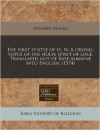3
Followers
24
Following
Cogitatio
Reflections on philosophy, theology and just observations on life.
Currently reading
The first epistle of H. N. A crying-voyce of the holye spirit of loue. Translated out of Base-almayne into English. (1574)
The Works of James Arminius, Volume 1
Politics, Law, and Morality: Essays by V.S. Soloviev
Meditations on the Soul: Selected Letters
The Complete Poetry and Prose
The Encyclopedia of Philosophy (8 Volumes in 4)
Cambridge Platonist Spirituality
Wellsprings of Faith: The Imitation of Christ; The Dark Night of the Soul; The Interior Castle
Paul and the Stoics
Locke: Two Treatises of Government (Cambridge Texts in the History of Political Thought)
The interest of reason in religion with the import use of scripture-metaphors, and the nature of the union betwixt Christ; believers: with reflections ... the knowledg of Jesus Christ, (1675)
 Robert Ferguson was a 17th century English Non-conformist. He was later tried as a plotter against the crown.
Robert Ferguson was a 17th century English Non-conformist. He was later tried as a plotter against the crown.He is an example of an erudite Protestant semi-Puritan theologian. A good part of this book is a refutation of another work by an author named Sherlock that indicated semi-Socinian tendencies. The Socinians were basically 17th century Protestant Arians; as Jehovah's Witnesses are the more modern version of the same. Arians basically deny the deity of Jesus Christ. This erroneous teaching has popped up time and again throughout the history of the church. It was refuted extensively and thoroughly by the Nicene fathers. Errors like this have a tendency to get revamped for some reason and metastasize into new cults that compete with traditional Christianity.
Anyway, a good portion of the book deals with methods of reading scripture and basic rules for using particular methods. His discussion of plain sense versus metaphorical is quite interesting and is treated exhaustively. His discussion of the church and what it constitutes is quite good as well; albeit from an absolutely Protestant perspective. One thing caught my attention particularly and that was his distinguishing between the idea of pardon and justification; he never really discusses his thoughts on this distinction in regards to salvation unfortunately. His discussion of what relationship Christ has with the church and individual Christians was interesting, although not entirely consistent, nor entirely clear. He spends some pages condemning the idea of Christian "oneness of essence" with God/Christ which he attributes to certain mystics (without ever quoting what they actually said) and then later states that we have "essential unity" with Christ. The phrases are really practically identical in meaning and he never states what he believes the differences are between the two. In vain I waited for him to clarify the difference but he never did; and in fact seems to hold the same doctrine he condemned at least grammatically. I think his real mistake was not understanding how the church fathers and the mystical writers talked about divine union. They described it as the soul being like metal that is heated; the metal doesn't lose it's distinct nature, it gains fire/heat which permeates the whole substance. His misunderstanding of what mystical theologians meant may have contributed to his reproachful attitude; as well as contributing to his own inability to fully comprehend his own position on the church's unity with Christ. The book is quite long and it would be impossible to give it a thorough treatment in this review.
The book on the whole was a good read and I didn't have to take an extended break from it, even though it was over 600 pages. Most of his points I agreed with and don't feel like anything was discussed shoddily. My only real bone of contention I addressed above. I give it an excellent review.













